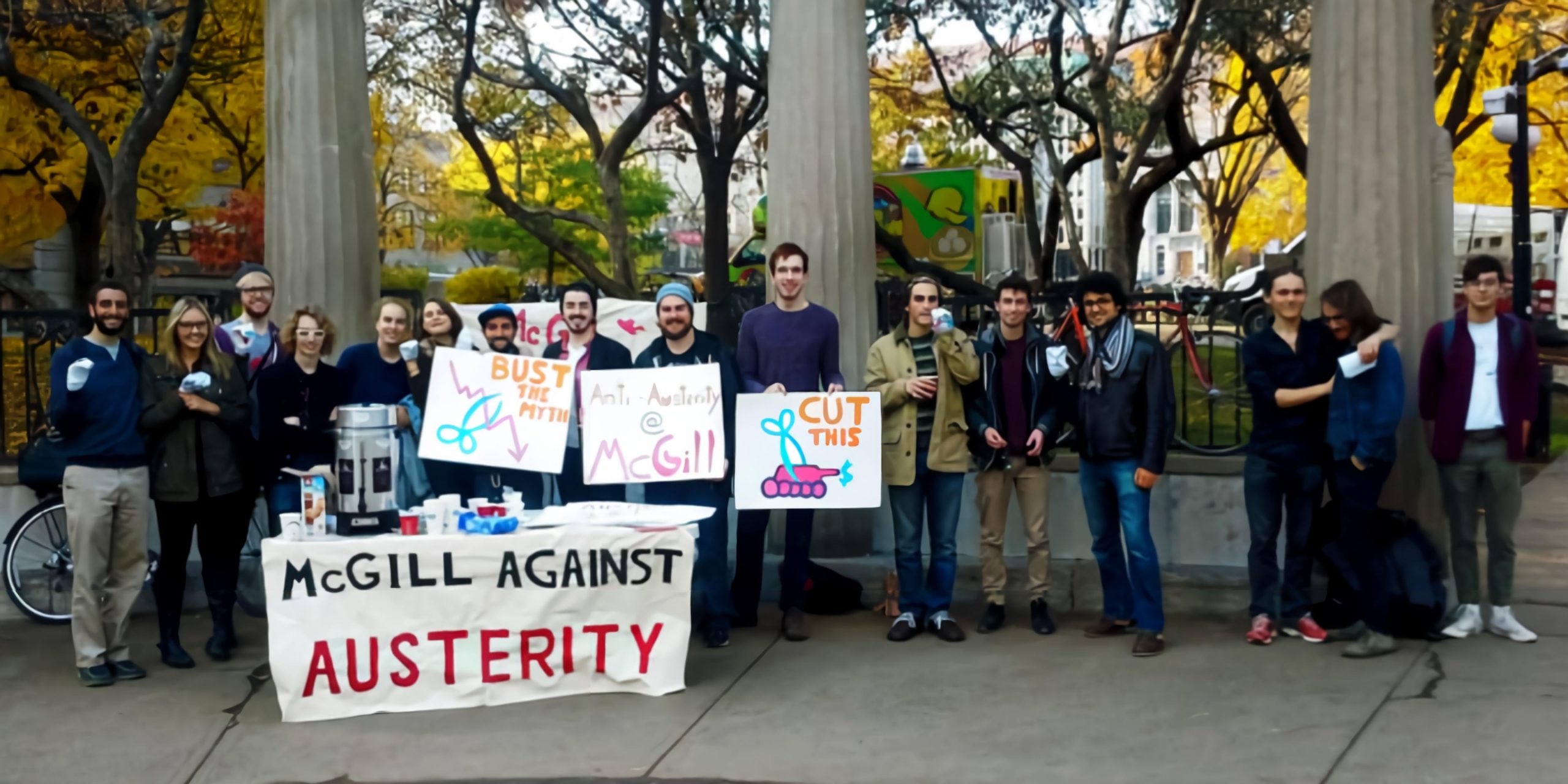
OTHER CAMPAIGNS
In the past, SSMU External Affairs has supported coalition building between student groups on campus that advocate for various political campaigns working towards a more equitable and sustainable future through initiatives like Solidarity Alliance McGill (SAM). While SAM is not active at the moment, SSMU External Affairs continues to offer support for these types of initiatives which are essential in building mobilization and can be independent from the Society.
We also have mandates to support the following campaigns. For more information on how to gain support from SSMU for a political campaign, check out the Guide to Political Campaigns!
Universities Allied for Essential Medicines
Universities Allied for Essential Medicines is a global advocacy group of university students across over 100 research universities. The mission of this organization is to campaign for the removal of medicinal barriers, such as academic patenting, and advocate for medicinal research to consider and support the global population. The McGill chapter of Universities Allied for Essential Medicines leads the campaign here, supported by the SSMU through policies such as the Global Access to Medicines Policy. The SSMU also demonstrates support towards this campaign in the Positions Book, as seen in Position 11 (Research) and 13 (Wellness).
Email: uaem@ssmu.ca
Instagram: @uaem_mcgill
Facebook: UAEMMcGill
Menstrual Justice Campaign
At SSMU
The Menstrual Hygiene Project was established in 2017 by the SSMU to supply menstrual hygiene products on campus for students, completely free of charge. This was started with the motion passed at the SSMU Legislative Council, and the importance of access to necessary personal health products has been highlighted through this project. This motion and initiative are motivated by efforts to decrease the financial burden of these products, which are expensive and can be difficult to access for many students.
All SSMU members currently pay a nominal fee each year and the collected monies fund the purchase of dispensers, products, and labour. The initiative also collaborates with other SSMU services and external organizations to provide products to community members who can benefit from having them.
For more information or to get involved, contact the Menstrual Health Commissioner menstrualcommissioner@ssmu.ca or the Vice-President (University Affairs) ua@ssmu.ca.
In the Province
At the provincial level, SSMU is collaborating with the Réseau québécois d’action de la santé des femmes (RQASF) in a campaign that aims to highlight menstrual precariousness and to mobilize people to achieve menstrual equity for all in Quebec. The Fil Rouge campaign focuses on menstrual precariousness and its issues within the student population and takes into account that not all women menstruate and not all menstruating people are women. Its avenues of reflection include: the generalization of free menstrual products on campus, the exchange of good practices and the collection of recommendations for the attention of the authorities; the sensibilization to the use of durable products as a means to reduce student menstrual insecurity.
To learn more about the Fil Rouge Campaign, contact the RQASF via email communications@rqasf.qc.ca and follow them on social media:
Instagram: @rqasf_officiel
LinkTree: linktr.ee/RQASF
Facebook: Le FIl Rouge-RQASF
Twitter: @RQASF
Youtube: LERQASF
McGill for Universally Accessible Post-Secondary Education
The struggle for universally accessible post-secondary education is one that spans over decades at SSMU. Here is, however, a summary of its more recents highlights.
2012- Maple Spring/ Printemps érable
The Maple Spring refers to the student uprising against tuition hikes which started in February 2012. This movement saw nightly demonstrations at its peak, which often ended with mass arrests and repressive use of crowd control by the police. Protesters were attacked with stun grenades, pepper spray, and other crowd control tactics, including cavalry. At McGill, an event series (Reclaim your) Education week mobilized the student body, many departmental and faculty strike votes were held for the first time in McGill’s history, and the James McGill Administration building was occupied for 6 consecutive days.
2015-Anti-Austerity Campaign
In the spring of 2015 (printemps 2015), the Québec provincial government announced austerity measures that have led to, among other things, reduced funding for schools, massive cuts to healthcare, and drastic reduction to municipal employee pensions. Austerity in government is a set of policies which aim to reduce government spending. However, these policies are extremely detrimental to necessary public sectors such as healthcare and education. Austerity is also used to justify colonial resource extraction projects that are often forcibly undertaken despite resistance from affected communities. At McGill, advocacy against austerity was taken on by McGill Against Austerity, a group of students committed to popular education around the effects of austerity, and to engagement in the larger movement against the commodification of education.
2018-Drop Fees Not Bombs
McGill students joined their voice to that of Ontario students who were demanding not a reduction, or a freeze in the fees, but FREE education NOW for students across Canada. They condemned our institutions for simultaneously increasing our tuition fees while investing in corporations that manufacture arms and weapons, claiming that our institutions are complicit in the destruction of homes and countries across the globe, and demanded that the board of governors divest from Weapons arms manufacturers.
2019-Campaign Against Unpaid Internships
In March of 2017, SSMU passed a Policy against Unpaid Internships which mandates the VP University Affairs and the VP External affairs to implicate SSMU in the campaign for the remuneration of unpaid work. A symptom of the cultural rise of the commodification of education, unpaid internships have become a staple on our campus – especially in certain faculties as the devaluation of “feminized” labor is perpetuated. A popular education campaign began to raise awareness and build the foundations for a campaign in Fall 2018. In the Spring of 2019, thousands of university and CEGEP students across Quebec took part in a week-long strike protesting unpaid internships. Over 35,000 university students in Montreal, Sherbrooke, and Gatineau participated in walkouts including McGill’s Social Work Student Association. Students indeed called for the compensation of interns for their work, and the extension of labor standards to unpaid internships.
2022- Occupation of the Arts Building
For 12 consecutive days, students occupied the arts building at McGill University. Dozens of tents blocked the hallway and the atmosphere was festive. These different people occupying the building were clear in their position: they were not asking for anything, they were building, independently, the democratization of their university. To learn more about the pillars of this occupation, consult Occupy McGill’s manifesto: Education for Liberation, Not Corporation.
Campaign for the Withdrawal of Policing and Criminalization
Policing disproportionately harms marginalised people, including but not limited to Indigenous peoples, Black People, People of Colour, sex workers, transgender and non-binary people, Queer people, people with disabilities, women, low-income and unhoused people, neurodivergent people, and undocumented immigrants. Given their relationship with marginalised people, the police and the criminal justice system fail systemically as institutions of public safety. Equitable representation of marginalised peoples in the police force nor greater sensitivity training may be helpful, but cannot fully resolve problems of systemic discrimination and violence in policing. Indeed, police interventions do not address the root causes of social marginalisation and insecurity but tend, rather, to exacerbate systemic oppression and stigmatisation. In fact, marginalised people are disproportionately surveilled, detained, and convicted by the police and criminal courts, and many criminalised behaviours are the result of social marginalisation and inadequate support for social services.
2020 was eye-opening for many who only then realized the violence and brutality that the police inflicts upon those it is supposed to protect. This problem isn’t new, nor will it go away when state-sanctioned violence continues to be perpetrated by police. Ensuring public safety for marginalised people requires the withdrawal of policing and criminalisation, and the expansion of life-affirming services that respond to social marginalisation. Accordingly, SSMU adopted a position on Institutions of Public Safety (14).
No group at McGill currently tackles this issue. Consequently, SSMU aims to support and collaborate with external groups in Tio’Tia:ke. If you are interested in getting involved or starting a campaign at McGill, please reach out to the Political Campaign Coordinators (campaigns@ssmu.ca) or any of the following organizations.
Defund the Police Coalition (and its members)
Linktree: https://linktr.ee/Defundthespvm
Email: defundmontrealpolice@gmail.com
Instagram: @defundlapolice
Facebook: DefundLaPolice
Solidarity Across Borders
Website: http://www.solidarityacrossborders.org/
Email: solidaritesansfrontieres@gmail.com
Instagram: @ssf.sab
Facebook: CiteSansFrontieres
Twitter: @solidariteMTL
Collectif Opposé à la Brutalité Policière (COBP)
Website: https://www.cobp.resist.ca/
Email: cobp@riseup.net
Voicemail: (514) 395-9691
McGill Corporate Accountability Project
The McGill Corporate Accountability Project (MCAP) is a student group in the faculty of law doing activism against corporate baddies. Its active campaigns include a solidarity struggle with Dollarama warehouse workers in Montreal, who are primarily migrant workers from Haiti and Francophone Africa, fighting for dignity, permanent jobs, and fair working conditions.
MCAP brings McGill students and staff into collaboration with Montreal-based warehouse workers and collaborates with the Immigrant Workers Centre (IWC). To get involved with the IWC, look at their volunteer opportunities here. MCAP’s campaigns are anchored in the belief that workers and students hold a common interest in better working and immigration conditions, and should build bonds of resistance so as to strengthen their spirit, resilience, and numbers as a division between students and workers would only increase their vulnerability to exploitation by the profit-seeking corporate class.
To learn more about the Dollarama Workers Campaign:
- Take a look at the Motion Regarding Support for Dollarama Workers
- read up on the coverage produced by the Daily and the Tribune on the campaign’s progression and the working conditions in Dollarama warehouses.
Information on MCAP’s other activities, including their Protesters Legal Information Clinic (PLIC), can be found at https://mcap.ssmu.ca/.
To get involved with MCAP, contact McgillCAP@gmail.com.
